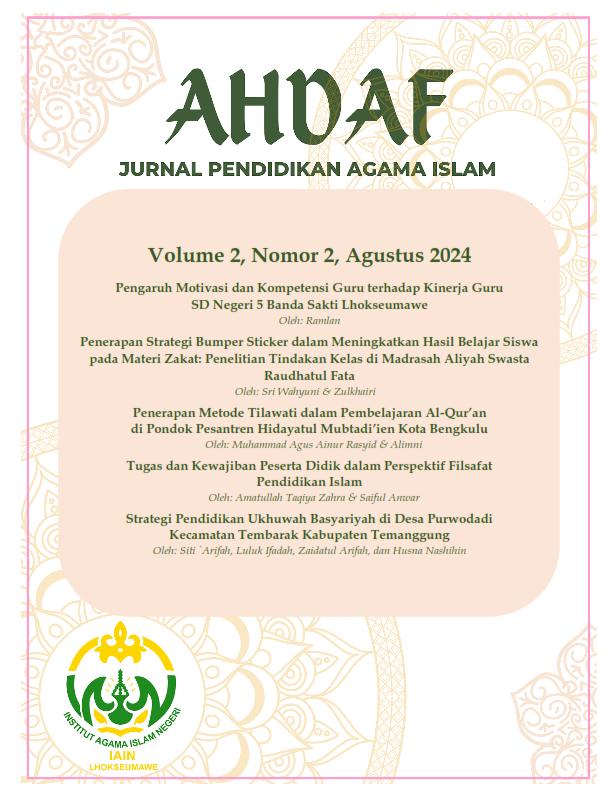Strategi Penguatan Ukhuwwah Basyariyah untuk Memperkokoh Kerukunan Sosial di Desa Purwodadi, Kecamatan Tembarak, Kabupaten Temanggung
Main Article Content
Siti `Arifah
Luluk Ifadah
Zaidatul Arifah
Husna Nashihin
This research aims to explore the application of the concept of ukhuwah basyariyah (universal brotherhood) in the lives of the people of Purwodadi Village, Tembarak Subdistrict, Temanggung Regency, the majority of whom embrace Islam with a diversity of religious organization affiliations. This research uses a qualitative approach with a phenomenological method, where data is obtained through observation, participatory, semi-structured interviews, and documentation. The data were analysed using Interpretative Phenomenological Analysis, through an analysis process including reading the data in depth, grouping the data based on relevant themes, and interpreting the data by considering the social context of the Purwodadi Village community. The results showed that despite differences in worship practices and affiliations with religious organizations such as Muhammadiyah, Nahdlatul Ulama (NU), and Majelis Tafsir Al-Qur'an (MTA), the people of Purwodadi Village were able to maintain social harmony through the application of ukhuwah basyariyah values, such as ta'āwun (helping), tasāmuḥ (tolerance), and musāwah (equality). Social and religious activities that involve all residents, such as community service, Muharam gebyar, and the celebration of Islamic holidays, become a means to strengthen solidarity between residents regardless of differences in mass organizations. The strategy to strengthen ukhuwah basyariyah in this village is carried out through various approaches, including social and religious activities, sermons, recitations, and conflict mediation. Despite challenges such as mass organization fanaticism, apathy of some residents, and low awareness of diversity, the community still managed to implement ukhuwah basyariyah effectively. This research implies that the values of ukhuwah basyariyah can be the basis for building social harmony in a multiorganizational society, with education, economic empowerment, and dialogue across mass organizations as the key to the sustainability of harmony. This research contributes to the understanding of the concept of ukhuwah basyariyah in the context of a diverse society, as well as the importance of integrating these values in social and religious life.
Abdurrahman, M. (2003). Rekonstruksi Pendidikan Islam dalam Masyarakat Plural. Yogyakarta: Pustaka Pelajar.
Abdussami, H., & Fakla, R. (1995). Biografi 5 Rais ’Am Nahdlatul Ulama: KH. Hasyim Asy’ari, KH. Wahab Hasbullah, KH. Bisri Syansuri, KH. Ali Maṣhum, KH. Achmad Siddiq. LTN Bekerja Sama dengan Pustaka Pelajar Yogyakarta.
Anggarini, F. S. (2019). Pengembangan Pendidikan Agama Islam dalam Masyarakat Multikultural. Al-Tarbawi Al-Haditsah: Jurnal Pendidikan Islam, 4(2). 106-121. https://www.syekhnurjati.ac.id/jurnal/index.php/tarbawi/article/view/5219/2806.
Arkoun, M. (1994). Rethinking Islam: Common Questions, Uncommon Answers. Boulder, CO: Westview Press.
Banks, J. A. (2001). Multicultural Education: Issues and Perspectives. New York: John Wiley & Sons.
Chambers, R. (1995). Poverty and Livelihoods: Whose Reality Counts? Brighton: IDS.
Chirzin, M. (2007). Ukhuwah dan Kerukunan dalam Perspektif Islam. Aplikasia Vol. VIII, No. 1, Juni 2007. https://digilib.uin-suka.ac.id/id/eprint/8321/.
Creswell, J. W., & Poth, C. N. (2018). Qualitative Inquiry and Research Design: Choosing Among Five Approaches (4th ed.). Thousand Oaks, CA: Sage.
Fukuyama, F. (1995). Trust: The Social Virtues and the Creation of Prosperity. New York: Free Press.
Goleman, D. (2006). Social Intelligence: The New Science of Human Relationships. New York: Bantam Books.
Harahap, T. (2021). Implementasi Nilai-Nilai Pendidikan Multikultural Dalam Pembinaan Kerukunan Umat Beragama di Kelurahan Sipirok Godang Kabupaten Tapanuli Selatan (Doctoral dissertation, IAIN Padangsidimpuan). https://etd.uinsyahada.ac.id/6989/.
Iryani, E., & Tersta, F. W. (2019). Ukhuwah Islamiyah dan Perananan Masyarakat Islam dalam Mewujudkan Perdamaian: Studi Literatur. Jurnal Ilmiah Universitas Batanghari Jambi, 19(2), 401-405. http://dx.doi.org/10.33087/jiubj.v19i2.688.
Izzah, I. (2018). Peran Pendidikan Agama Islam dalam Membentuk Masyarakat Madani. PEDAGOGIK: Jurnal Pendidikan, 5(1), 50–68. https://ejournal.unuja.ac.id/index.php/pedagogik/article/view/219.
Khalid, M., & Ritonga, F. U. (2022). Penerapan Prinsip Ukhuwah Islamiyah: Serikat Tolong Menolong Al-Amin Dusun X Desa Bandar Setia. Jurnal Penelitian Inovatif, 2(3), 433-440. https://doi.org/10.54082/jupin.97.
Kvale, S. (2007). Doing Interviews. London: Sage.
Kymlicka, W. (1995). Multicultural Citizenship: A Liberal Theory of Minority Rights. Oxford: Clarendon Press.
Malihah, A. N., Pratama, M. L., Salim, M. A., Marlina, T., Nizar, M. I., Baekhaki, F., ... & Hayati, S. N. (2023). Implementasi Nilai Bhineka Tunggal Ika dalam Harmonisasi Keberdampingan Hidup Organisasi Keagamaan Rifa’iyah dan NU di Desa Mangli. Kampelmas, 2(1), 405-413. https://proceedings.uinsaizu.ac.id/index.php/kampelmas/article/view/636
Musfiqon. (2012). Panduan Lengkap Metodologi Penelitian Pendidikan. Prestasi Public Publisher.
Narayan, D. (2002). Empowerment and Poverty Reduction: A Sourcebook. Washington, DC: World Bank.
Patton, M. Q. (2002). Qualitative Research and Evaluation Methods (3rd ed.). Thousand Oaks, CA: Sage.
Putnam, R. D. (2000). Bowling Alone: The Collapse and Revival of American Community. New York: Simon & Schuster.
Rahardjo, T., & Ramadhan, M. (2005). Menghargai Perbedaan Kultural: Mindfulness dalam Komunikasi Antaretnis. Pustaka Pelajar.
Rahman, M. H. T., & Harisudin, M. N. (2023). Pemikiran KH. Achmad Siddiq tentang Relasi Agama dan Negara di Indonesia: KH. Achmad Siddiq’s Thoughts on the Relationship Between Religion and State. Constitution Journal, 2(2), 75-96. https://doi.org/10.54082/jupin.97.
Rahmat, J. (2001). Islam dan Interaksi Sosial: Sebuah Pendekatan Sosiologis. Bandung: Mizan.
Ridho, F. (2023). Toleransi dan Ukhuwah: “Membangun Harmoni dalam Masyarakat Multikultural”. UInScof, 1(2), 1256-1268. https://proceedings.radenfatah.ac.id/index.php/UInScof2022/article/view/1137.
Samiyono, D. (2017). Membangun Harmoni Sosial: Kajian Sosiologi Agama tentang Kearifan Lokal sebagai Modal Dasar Harmoni Sosial. JSW (Jurnal Sosiologi Walisongo), 1(2), 195-206. https://doi.org/10.21580/jsw.2017.1.2.1994.
Shihab, M. Q. (2007). “Membumikan” Al-Quran: Fungsi dan Peran Wahyu dalam Kehidupan Masyarakat. Mizan.
Shihab, M. Q. (2007). Tafsir al-Mishbah: Pesan, Kesan dan Keserasian Al-Qur'an. Jakarta: Lentera Hati.
Smith, J. A., Flowers, P., & Larkin, M. (2009). Interpretative Phenomenological Analysis: Theory, Method and Research. London: Sage.
Spradley, J. P. (1980). Participant Observation. New York: Holt, Rinehart, and Winston.
Suparlan, P. (2003). Keharmonisan Sosial dalam Masyarakat Multikultural: Studi Kasus di Indonesia. Jakarta: LIPI Press.
Suparta, S. (2018). Persepsi Ulama Bangka Belitung tentang Teori Khilafah dan Implikasinya terhadap Ukhuwah Islamiyah dan Ukhuwah Basyariyah dalam Keutuhan NKRI di Bangka Belitung. Akademika: Jurnal Pemikiran Islam, 23(2), 367–386. https://doi.org/10.32332/akademika.v23i2.1237.
Syahputra, A. E. A. (2023). Nilai-Nilai Toleransi dalam Dakwah Perspektif Al-Qur’an. Al Burhan: Jurnal Kajian Ilmu dan Pengembangan Budaya Al-Qur'an, 23(2), 398-411. https://journal.ptiq.ac.id/index.php/alburhan/article/view/56/49.
Tilaar, H. A. R. (2002). Pendidikan, Kebudayaan, dan Masyarakat Madani. Bandung: Remaja Rosdakarya.








